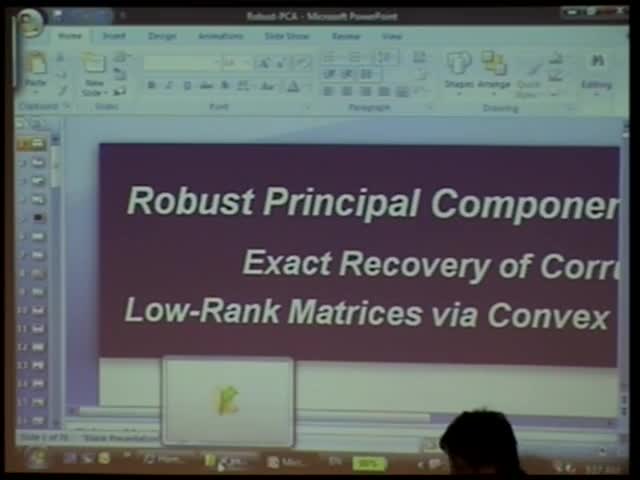Robust principal component analysis: Exact recovery of corrupted low-rank matrices via convex optimization
Presenter
October 6, 2009
Keywords:
- Convex analysis
MSC:
- 46N10
Abstract
Principal component analysis is a fundamental operation in computational data analysis, with myriad applications ranging from web search, to bioinformatics, to dynamical system identification, to computer vision and image analysis. However, its performance and applicability in real scenarios are limited by a lack of robustness to outlying or corrupted observations. In this work, we consider the idealized “robust principal component analysis” problem of recovering a low-rank matrix A from corrupted observations D = A + E. Here, the error entries E can be arbitrarily large (modeling grossly corrupted observations common in visual and bioinformatic data), but are assumed to be sparse. We prove that most matrices A can be efficiently and exactly recovered from most error sign-and-support patterns, by solving a simple convex program. Our result holds even when the rank of A grows nearly proportionally (up to a logarithmic factor) to the dimensionality of the observation space and the number of errors E grows in proportion to the total number of entries in the matrix. A by-product of our analysis is the first proportional growth results for the related but somewhat easier problem of completing a low-rank matrix from a small fraction of its entries. We propose a provably convergent algorithm based on proximal gradient and iterative thresholding that, for large matrices, is significantly faster and more scalable than general-purpose solvers. We provide simulations and real-data examples corroborating the theoretical results. The simulation results actually have revealed even more striking phenomena and remarkable pictures that merit future investigation.
This is joint work with my students John Wright, Arvind Ganesh, and Shankar Rao.
Brief Biography:
Yi Ma is an associate professor at the Electrical & Computer Engineering Department of the University of Illinois at Urbana-Champaign. He is currently on leave as research manager of the Visual Computing group at Microsoft Research Asia in Beijing. His research interests include computer vision, image processing, and systems theory. Yi Ma received two Bachelors’ degree in Automation and Applied Mathematics from Tsinghua University (Beijing, China) in 1995, a Master of Science degree in EECS in 1997, a Master of Arts degree in Mathematics in 2000, and a PhD degree in EECS in 2000, all from the University of California at Berkeley. Yi Ma received the David Marr Best Paper Prize at the International Conference on Computer Vision 1999 and the Longuet-Higgins Best Paper Prize at the European Conference on Computer Vision 2004. He also received the CAREER Award from the National Science Foundation in 2004 and the Young Investigator Award from the Office of Naval Research in 2005. He has given several Plenary Talks at international conferences. He is an associate editor of IEEE Transactions on Pattern Analysis and Machine Intelligence. He is a senior member of IEEE and a member of ACM, SIAM, and ASEE.
